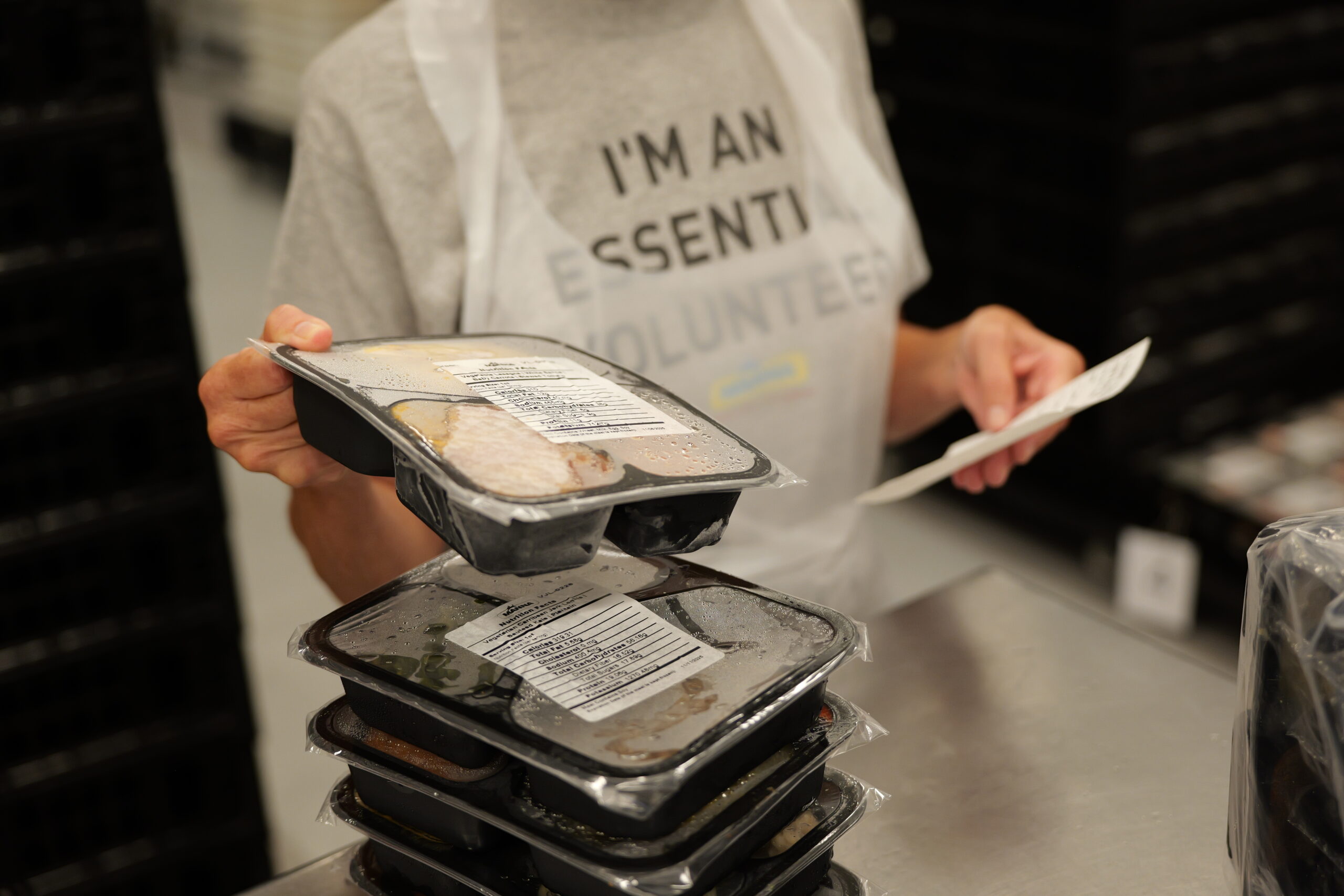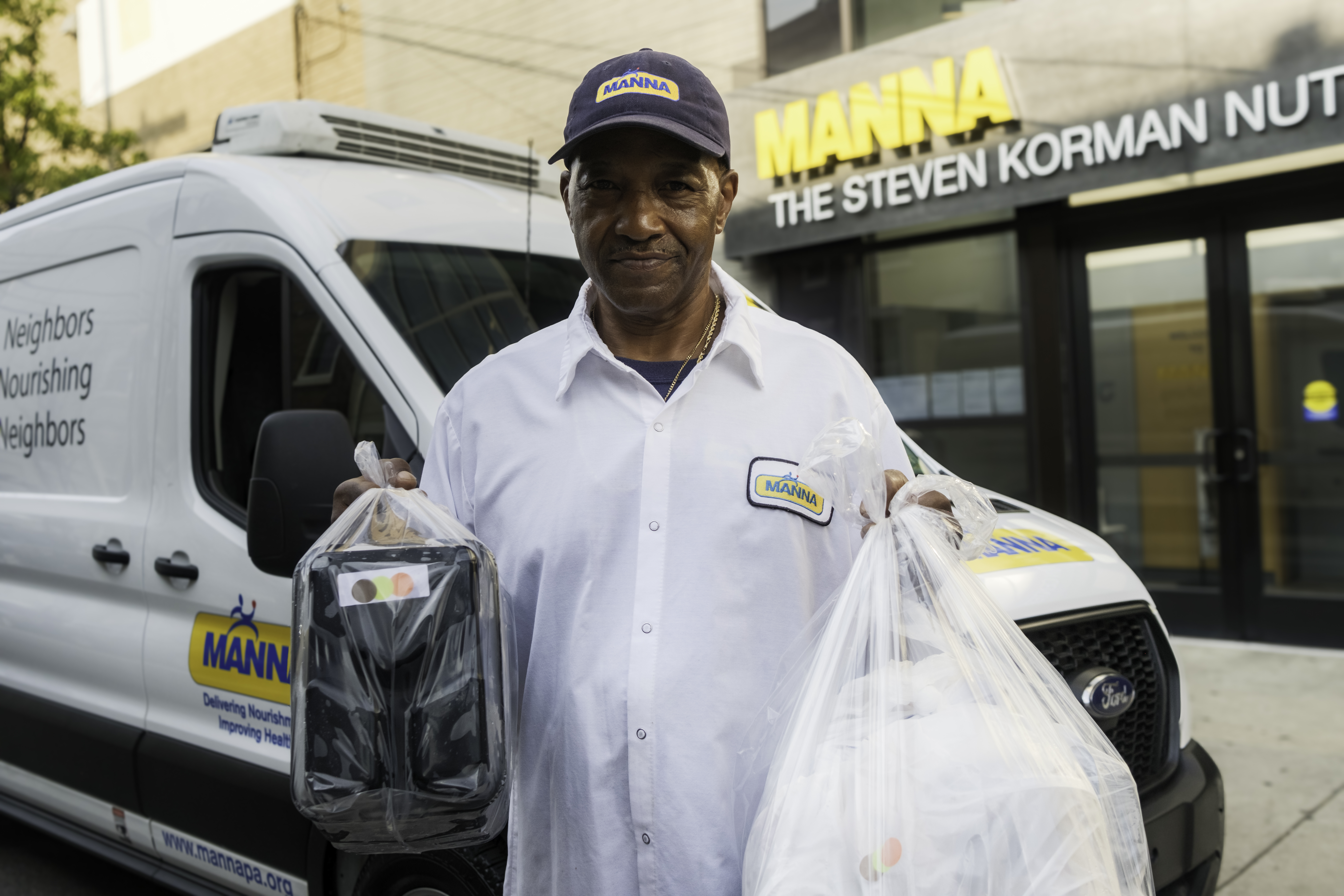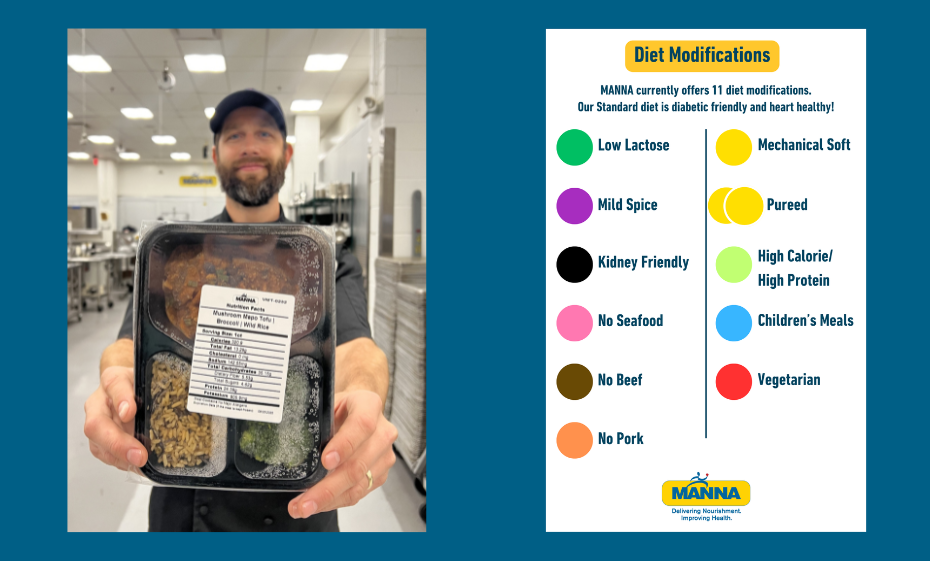Tag: MANNA
New Study Links MANNA’s Medically Tailored Meals to Health Gains for Heart Failure Patients
MANNA EXPANDS EVIDENCE-BASED MEDICALLY TAILORED MEAL OPTIONS WITH NEW VEGETARIAN MENU
January is National Soup Month
The blustery cold month of January is upon us. What better time than now to sit down to a hot, delicious bowl of soup to help warm you up! Soups are a great option nutritionally, they provide us with lots of important nutrients including vitamins and minerals for relatively few calories. Soup can be a simple addition to any meal and a great way to make sure that you and your family get the essential servings of whole grains, vegetables and protein in one bowl.
Although some canned soups can be healthy, they are often very high in sodium which can cause an increase in blood pressure and leads to a higher risk of developing heart disease. Sticking to low sodium, broth based canned soups would be the healthier way to go but preparing homemade soups can provide many more health benefits.
Preparing your own homemade soups allows you to control the nutritional value by adding plenty of vegetables, whole grains, healthy protein and herbs which naturally flavors your soup and allows you to skip the extra sodium. The winter months bring us a whole new variety of vegetables to choose from including cabbage, kale, leeks, mushrooms, turnips and winter squash. Squash is packed with tons of nutrients such as vitamin A, vitamin C and fiber. Adding lean meat like chicken or turkey will make the soup more filling while increasing the protein content. Making sure to use a low sodium beef, chicken or vegetable broth rather than one that is cream based will ensure the soup has less salt and fat.
Other benefits in cooking homemade soup is that it tends to be much more cost efficient. Preparing a large batch of soup will allow you to have leftover which you can freeze for a later time. Making homemade soups is a great way to keep warm and stay healthy throughout the winter months.

If you are crunched for time this winter season, why not purchase a delicious, homemade soup from MANNA? Starting Thursday, January 1st, we kick off our annual SOUPer Bowl fundraising event. Choose from 3 delectable soup flavors including Hearty Chicken Noodle, MANNA Minestrone and Creamy Corn Chowder. By purchasing our homemade soups you not only nourish yourself, but you support us in nourishing our MANNA clients. For more infomation, go to mannapa.org/souperbowl.
Healthy Butternut Squash Soup
YIELD: 6 SERVINGS
PREP TIME: 10 MINUTESCOOK TIME: 1 HOUR
TOTAL TIME: 1 HOUR, 10 MINUTES
Ingredients
1 butternut squash
1 yellow onion
32 oz. chicken (or vegetable) broth
2 tablespoons olive oil
Salt and pepper to taste
Instructions
Preheat oven to 450 F.
Peel, de-seed, and dice the squash into roughly 1-inch cubes (doesn’t need to be perfect).
Peel and dice the onion into roughly 1-inch pieces.
Place the squash and onion onto a foil-lined baking sheet. Drizzle with olive oil and season with a generous pinch of salt and pepper. Roast in oven for 45-50 minutes until squash is lightly golden and fork-tender.
In a large pot, bring the broth to a simmer. Add the roasted veggies. Puree using an immersion blender, regular blender, or food processor. (If using a regular blender or food processor, work in batches so that your container isn’t full to the brim, and be careful not to burn yourself). Finish with a drizzle of EVOO or spoonful of plain yogurt if you’d like, and enjoy! MORE
MANNA takes on D.C. at ACBP ’14
MANNA’s advocacy team – Executive Director, Sue Daugherty, Director of Policy and Institutional Affairs, Ann Hoskins-Brown, and Community Outreach & Advocacy Specialist, Katelyn Baron – attended the 2014 Advocacy Capacity Building Project (ACBP) Symposium September 29-October 1, at NASTAD in Washington D.C. The annual symposium encourages collaboration between “sister” organizations from all over the country, with over 50 attendees from 20 diverse food and nutrition services agencies this year. Each participant had the opportunity to share their best practices and recent advocacy activities; MANNA presented updates on how we are working to leverage our groundbreaking research with targeted advocacy work. Together, we brainstormed and discussed topics including the power of evidence and developing and delivering an impactful message.
The symposium offered several opportunities to participate in advocacy trainings to learn the tools of the trade, helping to facilitate successful interactions with elected officials and academic institutions. This training was crucial for our visits with staff from the offices of Congressman Chaka Fattah, Congressman Bob Brady, Senator Bob Casey and Senator Pat Toomey from Pennsylvania, along with several New Jersey legislators. Our Hill meetings, scheduled for our final day in D.C., provided the opportunity to share our “food is medicine” model and research with policymakers to demonstrate its potential to change healthcare. MANNA’s services save Pennsylvania valuable healthcare dollars and our clients experience improved health outcomes. We believe our meal program should be a reimbursable standard of care and a right to everyone facing a life-threatening illness.
Overall, our time in DC opened our eyes to many new possibilities. There is still much to learn and we are excited to redefine our goals and continue to move forward with our mission. ACBP has empowered us to take on new advocacy goals focused at the state level. It was motivating and refreshing to share and hear new ideas about our unique services. MANNA has many challenges ahead, but we will continue to advocate for the incorporation of nutrition into healthcare.
We want to thank The M•A•C AIDS Fund, The Center for Health Law and Policy Innovation at Harvard Law School, AIDS United, the National AIDS Housing Coalition, Representatives from the Department of Health and Human Services (HHS), and the Centers for Medicaid and Medicare (CMS) for all of their support. To all of our sister organizations, we thank you for collaborating and learning with us. These organizations include: God’s Love We Deliver, Project Angel Food, Open Hand Atlanta, Project Angel Heart, AIDS Project New Haven, AIDS Services Foundation Orange County, Moveable Feast, Community Servings, Project Open Hand, Bill’s Kitchen, Inc., Heartland Health Outreach, Mama’s Kitchen, Long Island Association for AIDS Care, Food & Friends, The Poverello Center, Lifelong AIDS Alliance and the Academy of Nutrition and Dietetics.
To see more pictures from our DC visit, see our Facebook album.
Food is Medicine Advocacy
Our research shows that people battling life-threatening illnesses who receive MANNA services save healthcare dollars and experience improved health, all while having the quality and stability of their lives enhanced. Our staff, volunteers, donors and clients know that the mission is important and impactful, but it is important that our elected officials understand MANNA’s critical role as well. MANNA’s advocacy committee develops and implements strategies to advocate the “food is medicine” concept and continually works to advance MANNA’s mission.
With crucial support and training from the M·A·C AIDS Fund, our Executive Director, Sue Daugherty, Director of Policy and Institutional Affairs, Ann Hoskins-Brown and Community Outreach and Advocacy Specialist, Katelyn Baron will be attending the annual Food & Nutrition Services Symposium in Washington DC from September 29th to October 1st. This symposium encourages collaboration between peer organizations and offers training on interacting with elected official and academic institutions. The MANNA team will meet with staff from the offices of Representative Chaka Fattah, Representative Bob Brady and Senator Pat Toomey from Pennsylvania along with several of their New Jersey counterparts. MANNA’s goal is to help these officials understand that food truly is medicine and nutritional support should ultimately be a reimbursable standard of care that is a right to everyone facing a life threatening illness.
Continue to check our blog for more updates on MANNA’s “food is medicine” advocacy work.
October is Vegetarian Awareness Month
Even for non-vegetarians, October is a great time to take an extra moment or two to reflect on personal food choices. What we eat affects our health as well as the planet in significant ways. Every meal matters when it comes to making a difference. One way to start small with your veg journey is to start with one vegetarian night a week, “Meatless Mondays.” Try to challenge yourself, friends and family to eliminate meat from your Monday meals by creating an entirely vegetarian breakfast, lunch and dinner. Even MANNA clients can participate in this vegetarian endeavor, we offer one vegetarian dinner entrée per week in addition to a large variety of fruit and vegetables with their meals.
There are several reasons to think about vegetarianism. For starters, it is a great way to focus on eating veggies. Five a day is the goal, and more is even better! All MANNA meals strive to emphasize fresh fruits and vegetables. Combined with exercise and other healthy habits, plant-based diets can reduce the risk of hypertension, heart disease, and type 2 diabetes. Also, vegetables, fruits and legumes tend to be very nutrient dense and are full of vitamins, minerals, fiber, and phytochemicals. A vegetarian diet can also help double down on fiber and then some, the average American gets only about 12g of the 35 g. of fiber per day that is recommended.
Curious to learn more about the health benefits of a vegetarian diet? Or just looking for some ideas? Try these resources:
www.vrg.org/nutrition or www.vegetariantimes.com
Need another reason to picks beans instead of burgers in October? Do it for the planet! Vegetarian diets require less water for production and produce less CO2 as a byproduct. On a nationwide scale, this really adds up. For more information on the environmental effects of meat production, check out the article below.
www.science.time.com/2013/12/16/the-triple-whopper-environmental-impact-of-global-meat-production/
Food is Medicine: A Growing Belief
Despite its humble beginnings, the “food as medicine” principle that MANNA’s system is based on is finally beginning to be recognized and acted on by our policymakers. A fact sheet published in July by the Union of Concerned Scientists reports that the new Farm Bill includes a program that will use healthy food access to help prevent chronic illnesses and reduce medical costs.
The report comments that the American diet, typically high in meats, sugars, and processed foods and low in fresh fruits and vegetables, has led to the highest spending in health care of any country in the world. Most of our medical spending is on chronic illnesses, many of which could be prevented by improved diets. However, prevention and treatment is not as simple as just telling people to change their diets. The U.S. food system makes it very difficult for many people to access healthy foods, given that most low-income communities lack stores that sell fresh fruits and vegetables, and those that do often sell them at unaffordable prices.
The 2014 Farm Bill begins to address this problem with a program called the Food Insecurity Nutrition Incentive (FINI), which offers grant funding to community organizations working to secure affordable access to healthy foods. FINI requires that organizations match these federal funds with contributions from other sources. The report by the Union of Concerned Scientists suggests hospitals supply the match, using The Affordable Care Act requirement for community benefit initiatives. FINI provides the opportunity for health care facilities and healthy food initiatives to collaborate, all in the name of improving health and reducing health care costs.
At MANNA, we support initiatives like this that break down the perceived barrier between health care and food. While MANNA is not a preventative service that would fit under FINI, we do work in the same realm, using food as an integral part of a treatment plan. Healthy food is critical to a healthy life and we hope to see more progressive legislation in the future that builds on the understanding that food is medicine.
This post is by Kelly McGlynn, rising senior at Brown University and former Advocacy & Health Policy Intern at MANNA.
August is Family Meals Month
August is Family Meals Month, a time to take a break from busy schedules and come together as a family to share a meal. Eating together four or more times in a week has proven benefits, including nutritional health.
Family meals are an opportunity for conversation which teaches children how to listen and provides them a chance to express their own opinions, giving them a voice in the family. Positive dinner conversations and active listening expands children’s vocabulary and reading ability and increases their sense of security. Family meals have a positive impact on children’s values, motivation and self-esteem. Eating frequent meals together also encourages positive nutritional health. Planning, preparing and cooking healthy meals together teaches children the skills they need to carry on these healthy eating habits throughout adulthood. Studies have shown that families who eat dinner together tend to eat more fruits and vegetables and healthy protein sources and fewer fried foods and soda.
August is also a very popular month for kids to go to summer camp. Campers are often exposed to new foods that are also wholesome and nourishing. This month, MANNA’s Registered Dietitian, Alura Costa, will be teaching an interactive nutrition workshop at Camp Dreamcatcher. Alura will talk with campers about healthy eating and demonstrate ways for the kids to prepare the foods at home. Look for more information and photos from this day on the MANNA blog and website. Learn more about this camp for children whose lives have been touched by HIV/AIDS at www.campdreamcatcher.org.
Shut Up & Dance – Interview with Ian Hussey, Producing Director
MANNA: Why Victoriana as a theme?
Ian: Coming up with a theme for the poster if one of my FAVORITE parts of the process. The process starts with a few brainstorming sessions with photographer Brett Thomas, designer Matt Bouloutain of Modern Good, MANNA’s event manager and myself. Brett and Matt are incredibly talented artists and we are so luck to have them. This year’s theme of a singular female in a Victorian style dress came from me but wasn’t even an idea that I had thought of before the meeting. I threw the idea out there and everyone loved it. I could not be more excited about the image we finished with. Kelsey looks so beautiful…an incredible shot by Brett and with Matt’s magic – we created a unique eye catching design.
MANNA: What other elements (themes) will be presented during the show?
Ian: I can’t really speak on the pieces yet since they are not complete. That is the exciting thing about Shut Up & Dance – there is always a certain amount of the unknown going into the show. As the director, I do not censor any artist or tell someone they have to choreograph a certain kind of piece. I let the dancers express themselves any way they feel and because of that, I often don’t know what the show is really going to look like as a whole until the week of the show.
MANNA: When people leave the show on March 22, what feeling do you want them to take away with them?
Ian: I want the audience to have fun more than anything. There are many emotions in watching Shut Up & Dance every year because of the time we take to reflect on the serious nature of MANNA’s mission. Shut Up & Dance is aimed to uplift and garner hope for a greater future for MANNA and their clients. We aim to inspire continuous support for MANNA and hopefully to return next year with more friends and family spreading the love of this one of a kind show.
MANNA: How many years have you been involved with Shut Up & Dance?
Ian: This is my 10th Shut Up & Dance that I have been a part of and my 3rd year as the Producing Director.
MANNA: With every year that passes, what keeps you coming back for more?
Ian: I keep returning to Shut Up & Dance for many reasons but mainly for the impact it has on MANNA. The service that MANNA provides for the community is so incredibly important and it is an honor for the dancers and myself to put this show on every year to help MANNA accomplish their mission.
MANNA: For those who never been to Shut Up & Dance before but have been to a ballet production — how is Shut Up & Dance different?
Ian: Shut Up & Dance is such an unique experience. Many of our shows with Pennsylvania Ballet are either a full length story ballet or consists of 3 pieces in a night. With Shut Up & Dance, you will see upwards of 12 different pieces of shorter length but brought to you by the enthusiastic minds of the dancers of Pennsylvania Ballet. You will see serious ambitious pieces mixed with more light hearted comedic fare. The energy of this night every year…is infectious!
MANNA: Last year, you did not dance in the performance…can we look forward to you dancing this year?
Ian: Yes, you can look forward to me returning to the stage dancing…
Check out Ian, the Dancers of Pennsylvania Ballet and the magic on March 22nd at the Forrest Theatre – get your tickets at www.mannapa.org/dance










